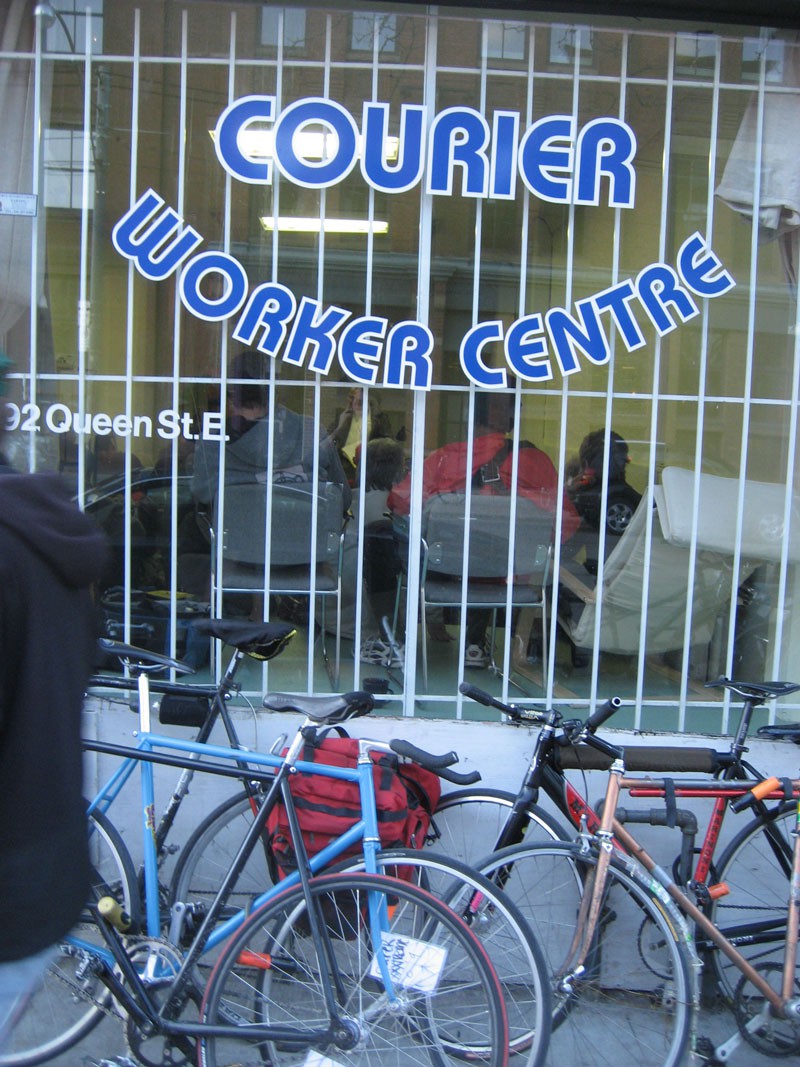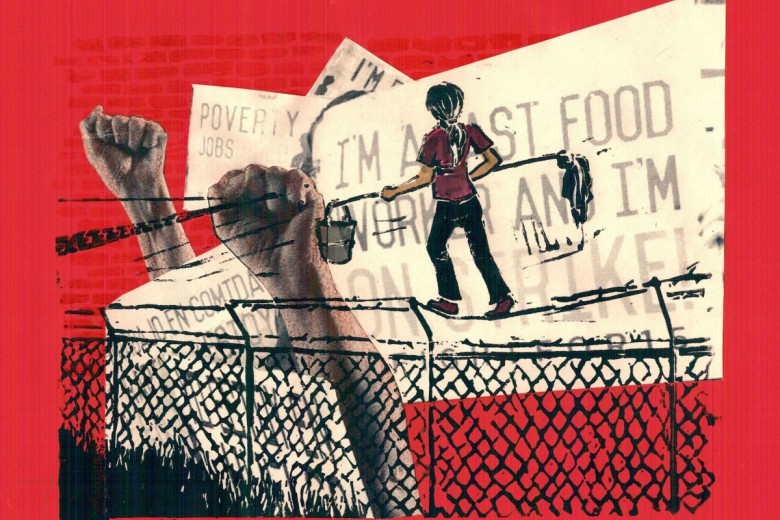
Being a bike courier was the first job Mark Hayward had that he not only liked, but loved. But times are tough: if he were offered a better job tomorrow, he’d be gone.
“For the first time ever, work was so slow, couriers were complaining they didn’t have enough money for food,” says Hayward. He sees joining a union as one answer to these tough times. As a result, he has been helping with the Canadian Union of Postal Workers (CUPW) campaign to unionize bike and car couriers in Toronto.
The tough economic times are not only affecting couriers. According to Statistics Canada, the number of jobs nationwide declined by 45,000 in July of this year. Since October 2008, manufacturing employment has dropped by 218,000 jobs, or 11.1 per cent. During this same period, the unemployment rate has increased by 2.3 per cent to 8.6 per cent, its highest level in the last 11 years. Many of these unemployed workers are former union members.
“We’re definitely seeing an increase in people who have been laid off due to bankruptcies,” says Karen Dick at the Workers’ Action Centre, a Toronto-based workers’ advocacy centre. “We’re seeing a lot of smaller companies just going under.”
But unemployment is only part of the picture. The quality and quantity of work also changes – usually for the worse – during an economic crisis. Dick says many workers who come to the Workers’ Action Centre have had their hours cut back from full time to two or three days per week. “They don’t want to quit a job, but can’t survive on two days of work a week.”
Offence or defence; that is the question facing unions during this economic crisis. Do they hunker down and weather the storms, defending their current membership as best they can? Or do they take a risk and reach out to organize new members who could benefit from the protection a union can offer?
Unions dealing with the crisis
Most union activists agree that organizing needs to be a priority during an economic crisis. “During difficult economic times, it’s even more important so workers have protections against employers’ actions to reduce costs,” says George Floresco, third national vice-president at the Canadian Union of Postal Workers.
Unions representing workers in manufacturing, construction, warehousing and forestry have been hit especially hard by the economic crisis. “Almost all the sectors we represent workers in have been hit hard by the recession,” says Alan Tate, executive secretary at the Communications, Energy and Paperworkers Union (CEP). “For us as a union, there’s a renewed commitment to organizing.”
Finding the resources for such a campaign, however, can be a particular challenge during a recession. “If a union has lost 10 to 15 per cent of its membership, it’s hard to get support for organizing [new members] from the current membership,” says John Aman, director of organizing for the Canadian Auto Workers.
“A lot of unions are just trying to survive and maintain their current bargaining units,” says Floresco. “I think unions are caught between mobilizing collectively against some of the government and corporate initiatives and their ongoing representation and servicing work with their members [on the one hand] and organizing new workplaces [on the other].”
Though little in-depth research has been done into the resources unions commit to organizing, according to a 2003 Human Resources Development Canada study, unions estimated they put 6.8 per cent of their resources into organizing. Fewer than half of unions surveyed had someone with the overall responsibility of organizing.
A good time for organizing?
Do uncertain times make workers more or less likely to organize?
“There’s always fear with an organizing campaign,” says Tate. “It’s hard to tell whether it’s past the normal fear.” According to Tate, the CEP has actually seen an increase in interest in organizing. He says workers from traditionally non-union workplaces like the technology sector have been approaching CEP about organizing. “These are people who didn’t think they needed a union and who are now beginning to see the result of the recession in their sector.”
Hayward has seen a similar spike in interest in his work with bike couriers. “As far as trying to pitch a union, it’s a pretty good time, because you don’t make enough money,” he says. “It highlights all the things that are wrong with your job situation.”
The statistics don’t bear out this anecdotal evidence, however: the number of applications for union certifications filed in Ontario so far this year is actually down, according to Voy Stelmaszynski, board solicitor at the Ontario Labour Relations Board. This is particularly true in the industrial sector, covering manufacturing and service industries.
Former Public Service Alliance of Canada (PSAC) organizer Aalya Ahmad sees this as a case of vulnerable workers being fearful of rocking the boat. When there are layoffs everywhere and not as many jobs available, says Ahmad, many workers get fearful of doing anything to attract the attention of their employer. “It’s inescapable that people will be less willing to risk much.”
Many union organizers believe the fear induced by the crisis can be countered through conversations and building trust. “The single biggest enemy of effective organizing is people’s apathy and fear,” says Ahmad. “You have to speak to that and challenge it.” Ahmad argues that it becomes increasingly important to emphasize that collective organizing makes workers stronger, not more vulnerable.
“The economic crisis has really reminded people of class issues,” says Ahmad. “We have the ability with the economic crisis to engage in discussions about class, inequality and social injustices.”
Learning to adapt
Going forward, unions are looking for ways to adapt their organizing drives to changing circumstances.
CUPW, for instance, has decided to go after the entire courier sector as opposed to targeting specific companies. The union recently opened a Courier Worker Centre in Toronto that offers support on employment issues for bike messengers and car couriers. According to Floresco, the union has decided to focus on a longer-term strategy by “talking to the workers about their issues and what they think is important, and building the trust between the workers and the union.”
The Workers’ Action Centre, funded by various foundations, the city and unions, relies on a similar strategy. Recently, the Workers’ Action Centre won changes to Ontario employment legislation dealing with temp agency workers.
Dick credits the leadership role played by temp workers themselves for the success of the campaign to change the legislation. “I think it’s essential that those workers we’re trying to organize are sitting at the planning table, are directing the campaign and the organizing,” says Dick. Throughout the campaign, temp workers were organizing, telling their stories and talking to the media and politicians.
Ahmad thinks unions need to focus their organizing efforts where they are needed most. “I would love to see more service workers being unionized, more immigrant workers being unionized. I think that’s where the next great passion of the union movement is going to happen.”
First, though, some changes are needed to make union organizing more inclusive and sustainable, says Ahmad. “That would involve making organizing less macho, would involve more attention being paid to building strong relationships, toward building the union, rather than just going for the certification.”
The economic crisis brings new challenges to organizing. Some of those challenges are difficult to overcome. “But at the same time, difficult economic times illustrate the need for a union in the workplace to offer a solution,” says Floresco.
Hayward agrees. “A lot of people are ready to discuss the idea of a union. A lot of people are angry they don’t have any control over the situation.”




_780_520_90_s_c1.jpg)

